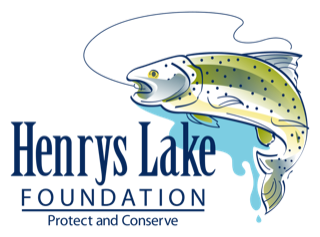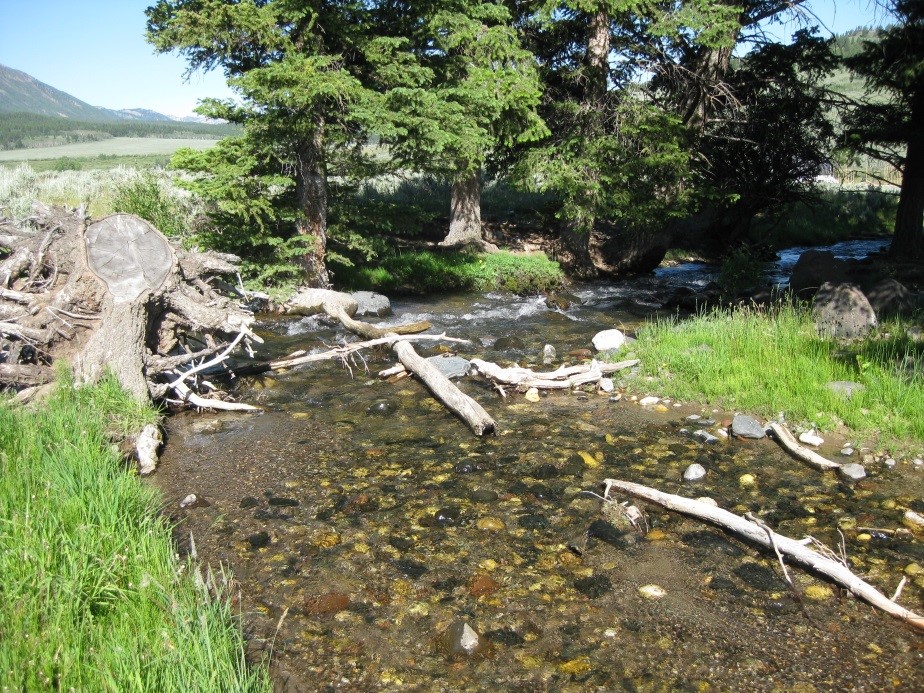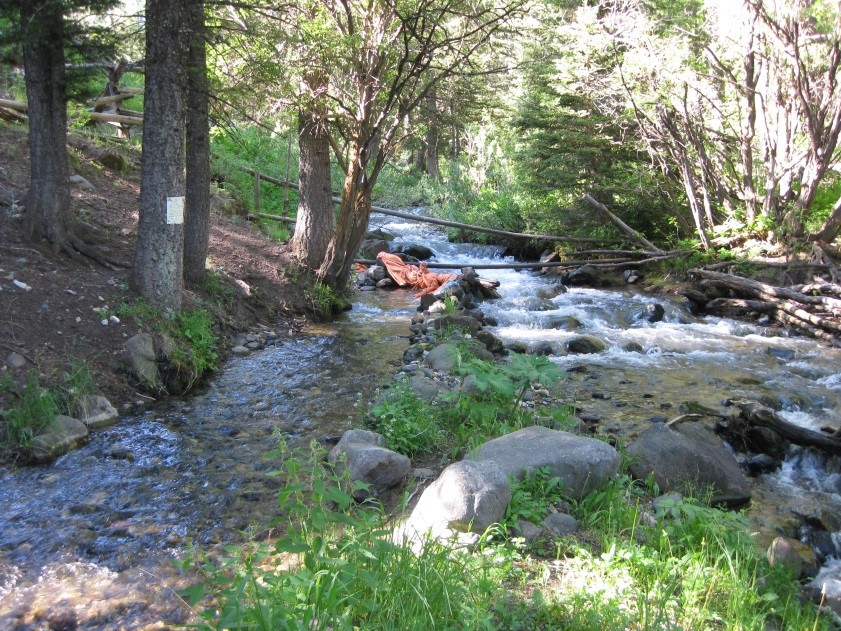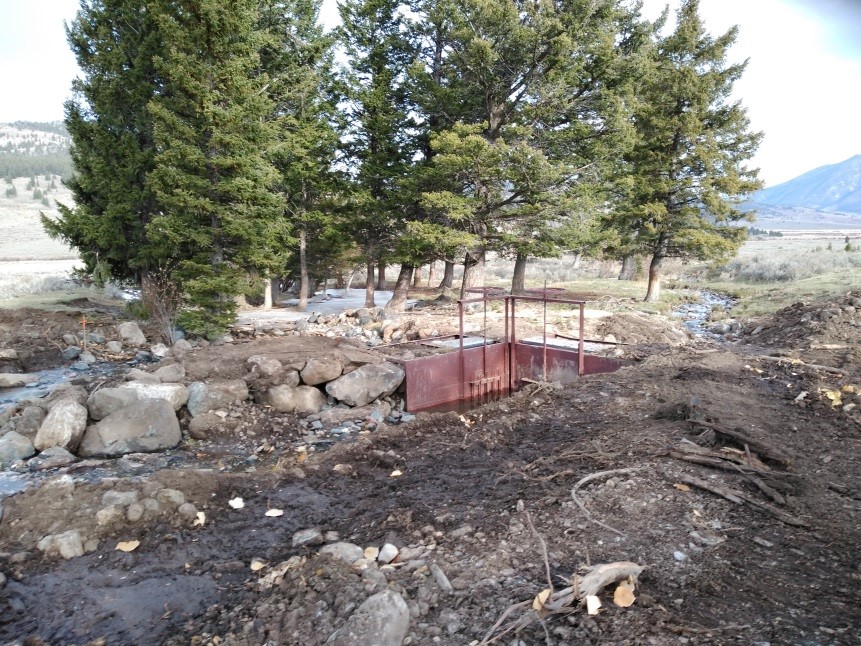Category: Uncategorized
Artist Helen Seay transforms the restrooms at Henrys Lake into works of art. For more details, check out the original story.
Oct 2019: 2019 Projects Report

For more 2019 Project details, read our 2019 HLF Newsletter
Henrys Lake Tributary Diversion Project
Most Henrys Lake anglers know that fishing success near Duck Creek is dependent on summer flows. During drought years, little water flows to the mouth and fish don’t congregate.
Likewise, spawning and rearing habitat in this vital Henrys tributary is minimal during poor water years. Side channels dry up and stream temperatures increase, making it unsuitable for fingerling rearing.
Simply stated, increase flows in Duck Creek and you increase fishing opportunity and improve habitat for Yellowstone cutthroat trout.
In 2015, the Henrys Lake Technical Committee formed to identify and prioritize fish habitat projects on Henrys Lake. The group identified the Duck Creek drainage as the number one priority. A project on Rock Creek (the largest tributary to Duck Creek) installing diversion control structures would increase flows by diverting water during periods when landowner irrigation was unnecessary.
In the winter of 2018, the Idaho Department of Fish and Game Regional Fisheries Manager-Brett High, coordinated efforts with the USFS, the Henrys Lake Foundation, and local landowners to initiate the project. Landowners Mike Moedl and Lynn Briggs had approved the project. Fabrication for the metal structures began under the supervision of USFS employees Lee Mabey and Louis Wasniewski. Construction site work was provided by Darin Schneider from IDFG. Project funding was provided by the Henrys Lake Foundation and grants.
In October 2019 the diversion structures were installed. In the spring of 2020 flumes will be added to monitor flows and reduce erosion.
Sawtell Peak and the Centennial mountains maintain winter snows well into late summer. From these snowy fields, Rock Creek flows. Thanks to this collaborative effort and dedicated landowners, water flowing from this tributary will now contribute to Duck Creek. Fish habitat will be improved and anglers will benefit. For over three decades, fish habitat improvement projects have been implemented on Henrys Lake. The Henrys Lake Foundation has provided funding, technical expertise, collaboration skills and labor to most of these projects. We are pleased to see our members’ contributions go towards projects that benefit fish habitat and angler opportunity.
Henrys Lake Foundation Funds Continuing Research
University of Idaho graduate student Darcy McCarrick has been studying factors influencing YCT populations in Henrys Lake utilizing radio telemetry transmitters. Last year Darcy tagged 50 YCT and 50 Utah Chub and studied their movement with fixed telemetry receivers placed in tributaries and with mobile tracking from a boat.
The purpose of this study is to determine the extent YCT populations are influenced by Utah Chub, and whether competition for food, prey resources, or space (thermal refuge) are playing a role. The study objective is to study movement and habitat use in the lake by both species. Results will identify possible interactions and provide insight that can be useful in the management of the fishery.
Because of the small sampling size, Darcy requested funding to extend the study to another year with deployment of an additional 50 tags for each species. Henrys Lake Foundation Board approved $5000 for expenses on this project, to supplement additional funding provided by Idaho Department of Fish and Game. We look forward to having more information on the results of this ongoing study.
In addition to the above projects, HLF continues to look for opportunities to improve riparian corridors along tributaries to improve water quality to the lake. This includes cattle fencing which includes fencing off the creeks and shoreline, providing watering gaps for cattle, hardening the crossings to reduce siltation, and maintaining continuity of fence lines. Several priority areas were identified for 2020. HLF is also continuing to look at tributary habitats in the south and west sides for potential improvements. Although no specific projects have been identified, the HL Project Team continues to discuss opportunities for future work.

The Henry’s Lake Foundation recently presented a $2000 grant to North Fremont High School for use in their FFA Aquaculture program.
In a statement from the Henry’s Lake Foundation: We are very pleased to work with the faculty, staff, and students of North Fremont High School. Henry’s Lake Foundation looks at this partnership as an opportunity to help the Aquaculture program not only with some financial support but by being able to share our many years of experience and knowledge to advance the learning opportunities of the students.
By supporting programs such as this, the benefits to the Henry’s Lake fishery are immediately recognizable. We are dedicated to see that we can develop the interest of local students to become professionals in the field. Also, to see that the riparian habits of the tributaries are protected and spend considerable time and monies for fencing the tributary streams, screening the irrigation diversions, improving culverts, hardening stream bottoms where cattle water and planting willows. They can now support a growing population of adfluvial fish and more readily serve as nurseries for developing fry. In addition to our natural production project work, we have projects in hatchery production, fisheries management and water quality.

The Henrys Lake Hatchery has a new Henrys Lake Fisheries Biologist, Jennifer Vincent. The Idaho Department of Fish and Game hosted approximately 75 people Friday night at the Hatchery facility on Henrys Lake, to meet Jenn and talk fishing. Henrys Lake Foundation and the Drift Lodge helped with the burgers and hot dog dinner including home-made sides and desserts.
Jenn will be responsible for collecting research data on fish and helping develop priorities for various fisheries projects. She will provide information about fish resources, regulations and policies to the public; analyze habitat quality and recommend and implement projects to improve fish habitat, including working with landowners who have streams on their property and want to improve them for fish. Basically, what this all means is she will continue the Hatchery’s efforts to improve fish habitat around Henrys Lake.
Jenn says, “I am really enjoying being up at Henrys Lake and I look forward to continuing to work with landowners and the Henrys Lake Foundation to improve fishing at Henrys Lake.”
Before coming to Island Park, Jenn was a Fisheries Biologist in Ontario, Canada, and she has also worked previously with Idaho Fish and Game, as well as the Oregon Department of Fish and Wildlife. She earned her Master’s degree at Trent University in Canada and her Bachelor’s degree at the University of Ontario Institute of Technology.
Richard Hodge, VP of Henrys Lake Foundation, said, “We have partnered with Fish and Game and the Henry’ Lake Hatchery for many years to improve fishing on Henrys Lake. We welcome Jenn to Island Park and we look forward to working with her and continuing our partnership with Fish and Game on fish habitat improvement projects throughout the lake and its tributaries for years to come.”

As printed in the Post Register – Dan Garren recently took over as supervisor for the Southeast Region of Idaho Department of Fish and Game. Garren, who’s based at the regional office in Pocatello, has more than 25 years of experience in Fish and Game agencies from three different states.
However, he said he is excited to be a regional supervisor in Idaho, a state whose citizens, he said, are highly engaged with Fish and Game. “Essentially we’re trying to provide opportunities for recreation,” Garren said. “And when you have an active and engaged sporting public, you just know that people appreciate the opportunities that you’re providing out there. I would 10 times rather have an active pubic than one that’s kind of disengaged from the resource.”
As regional supervisor, Garren oversees all management programs within his region. “Basically everything that Fish and Game is doing falls under the responsibility of the regional supervisor.”
Garren previously served as regional fisheries manager for the Idaho Department of Fish and Game in Idaho Falls. And though the Southeast Region is, as any other region, often buzzing with activity, Garren said he plans to spend his first few weeks on the job learning. “I certainly didn’t come in with an agenda,” he said. “I look at my role right now as just trying to learn. I’m in a learning phase right now trying to get up to speed on what’s historically been done and where we want to go in the future.”
But Garren already has shown interest in some of the region’s activities. He was one of the voices that expressed concern over Pocatello’s Wildlife Feeding Ordinance, which was recently proposed to the Pocatello City Council by the Urban Wildlife Task Force. The council agreed to further discuss the ordinance during a work study session, but the ordinance was pulled from the agenda after Garren, among others, took issue with the complicated prospect of enforcement of the ordinance. Garren said that, though Fish and Game serves as a technical adviser to the task force, the future of the ordinance was primarily up to the members of the task force themselves.
“We can provide the science behind different management options to the technical committee, but they’re really the drivers behind this,” Garren said. “And they’re the ones that need to work with city council to get an appropriate rule in place that the city council buys off on and that meets the objectives of the technical group.”
For the most part, though, Garren said he is still learning the ropes of the region. “I think the challenge for me is going to be getting up to speed on the issues as fast as they’re coming at us,” he said. “You come in to work thinking that you’re going to be working on a specific topic, and the reality is that you’re probably going to get something you weren’t even expecting. The diversity is pretty substantial, and I enjoy that.” He added that he has also enjoyed working with the region’s staff, who he said have been instrumental in helping him adjust to his new position.
“The exciting part is walking into a region where the staff is engaged and knowledgeable about the issues and willing to work with the public,” Garren said. “I’ve been really impressed with the quality of the staff and their engagement.” Overall, Garren said he looks forward to interacting with “these resources and these customers” in his new role and asked that the public be open. “I’d love to hear from people,” he said. “I’d love to hear thoughts and concerns about our programs as a whole and get a better understanding of what our public wants.”



